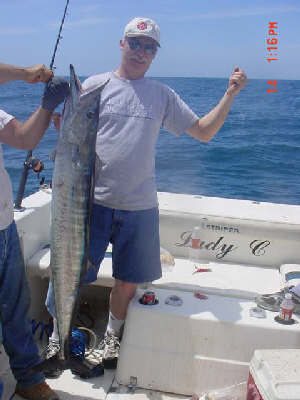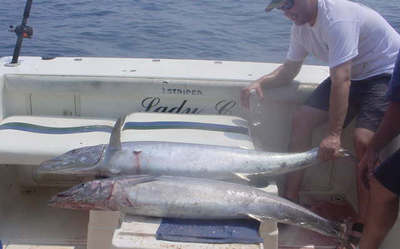When Wahoo hits your lure at 60 miles an hour and runs your 30 lbs test line for a few spurts of 100 to150 yards , you have discovered an allure that no other fish will give you. The Wahoo or (Acanthocybium Solanderi) is lean, sleek, torpedo looking fish that may be confused with a king mackerel to someone who has never seen one before. The mackerel however does not run like a Wahoo nor does it display the classic vertical bands that extend its lateral lines. The Wahoo are also normally found in deeper blue water zones where tuna are often running, as is the common case. Few argue that there is a better tasting fish than the Wahoo.It can be argued that there isn't a fish in the ocean that has whiter meat than a Wahoo and the texture of the meat makes you want to eat all of it as Sashimi, Sushi or very lightly seared. It is a crime to cook this fish for longer than a few minutes, as there is no need to alter its texture from its right out of the water texture.
It hits a Texas fishing peak in May and can last all year. Wahoo grow rapidly from birth often growing to five feet in range. The older ones seem to be rounder at the girth, the bigger ones often reaching above 70+ pounds. On average in the Texas waters Wahoo are caught between 20 and 80 pounds and a lot come from 12-50 miles offshore. In Texas Wahoo is not sought out commercially and even difficult to hook one on rod-and-reel due to their hard mouth and razor sharp teeth. But, Most boats manage with extremely sharp hooks and lures. Hence, they are often lost as often as landed. When it comes down to it, Wahoo are not under much fishing pressure and no regulations to date have been imposed or size limits.
To catch a Wahoo, a fisherman will need over 100 lb. steel test leader and it needs to be about 3 to 4 feet in length. It is often that you will see the marks of the leader wire along the sides of the Wahoo body after catching one. On a few occasions I have witnessed fishermen wanting to use monofilament test leader only to be amazed at the mono shreds left from the hoos razor like teeth. To cach them, our local fishermen will recommend Rapala And Yozuri lures and deepwater divers anywhere in the 3 to 5 inches range as with anything saltwater the bigger the lure the bigger the fish remember a weighted lure is best. Your luck with the lure will vary depending on what the Wahoo are eating in the area you are fishing.
In Texas, we troll for Wahoo's although I have on occasion caught a few bottom fishing for grouper. When the word is out that they are around, weve rarely failed to catch them Most often trolling is the key on most charter boats a trolling trip for wahoo can cost big bucks so choose your charter very well make sure they have caught wahoo at least more than 3 times as this will benefit your luck at possibly getting and landing one on the deck and remember there is no limit on wahoo.
This being said if you have never had a chance to catch one try it
1 wahoo will make your dreams come true . One of the best time water
shows you can find.
Come find out why they say "WAHOOOOOOO "



